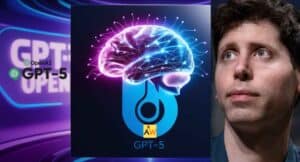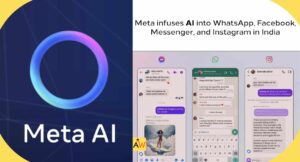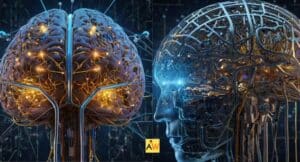Sam Altman’s Bold Vision for Artificial General Intelligence (AGI) Dominance
In a statement that sent shockwaves through the AI community, Sam Altman, the visionary CEO of OpenAI, made a bold claim that has left researchers and tech enthusiasts alike buzzing with anticipation. Referring to the cutting-edge GPT-4 model that powers the groundbreaking ChatGPT, Altman declared, “GPT-4 is the dumbest model any of you will ever have to use again by a lot.” This jaw-dropping assertion wasn’t a dismissal of GPT-4′s impressive capabilities but rather a tantalizing hint at the mind-blowing potential of OpenAI‘s upcoming models, GPT-5 and GPT-6.
Altman’s confidence in the rapid progression of AI capabilities is unwavering, as he stated with “a high degree of scientific certainty” that GPT-5 will be “a lot smarter than GPT-4,” and GPT-6 will similarly surpass its predecessor in intelligence and versatility.
This bold prediction has ignited a frenzy of speculation and excitement within the AI community, as researchers envision a future where language models exponentially increase in power, paving the way for unprecedented breakthroughs and applications.
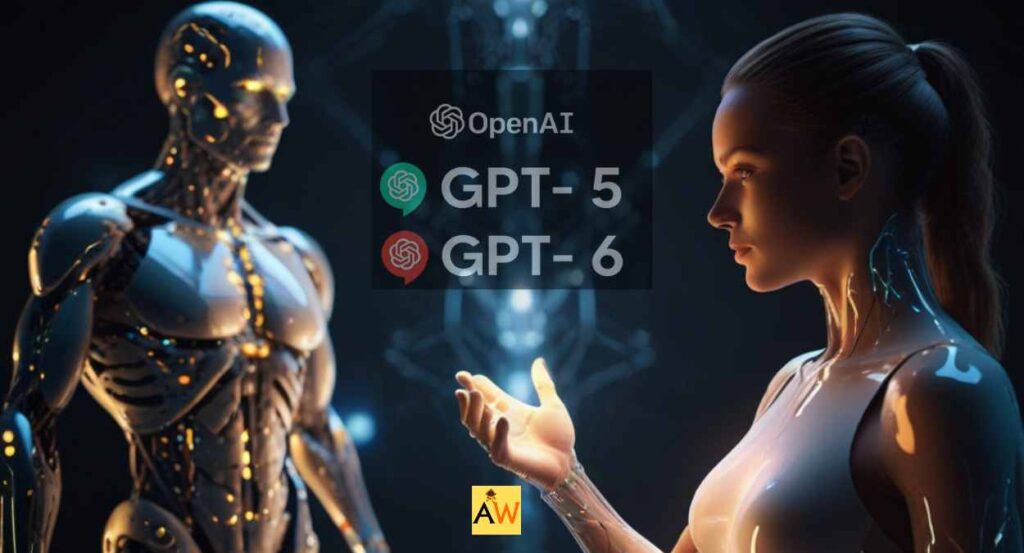
But Altman’s ambitions extend far beyond mere language models. His ultimate goal is to achieve dominance in Artificial General Intelligence (AGI), a holy grail of sorts in the AI world, where machines can match and potentially surpass the breadth and depth of human intelligence.
With a willingness to invest astronomical sums – up to $50 billion annually – Altman is leaving no stone unturned in his relentless pursuit of this revolutionary technology. Buckle up, as this article delves into Altman’s mind-blowing vision, exploring the potential implications of GPT-5, GPT-6, and the quest for AGI dominance that could redefine the boundaries of what’s possible in the realm of artificial intelligence.
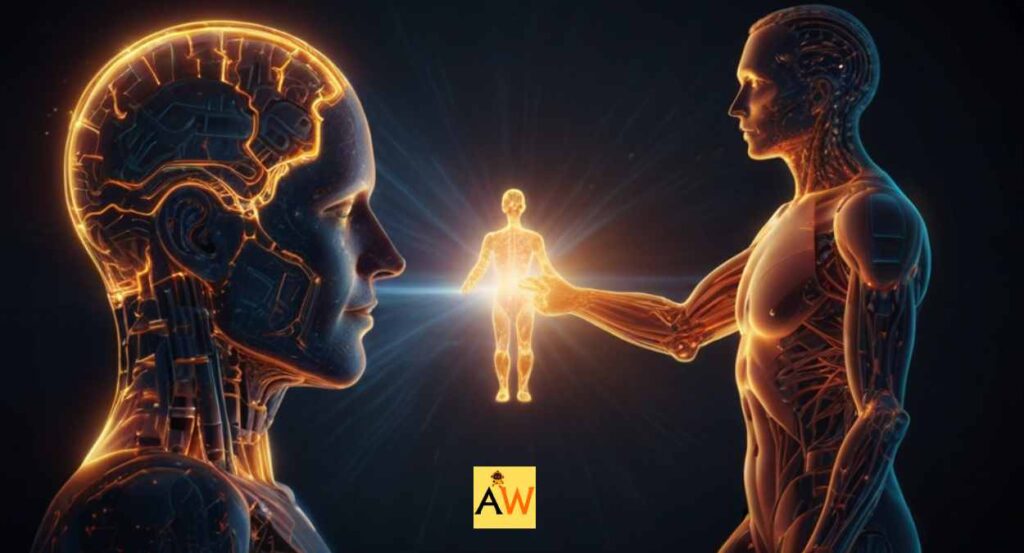
The Generative AI Revolution: OpenAI’s Pioneering Role
OpenAI has been at the forefront of the generative AI revolution, spearheading the development of groundbreaking models like DALL-E for image generation and the recently unveiled Sora for video creation. However, Altman’s vision extends far beyond these impressive achievements, as he aims to unlock the full potential of artificial intelligence through the pursuit of AGI.
“If we go build AGI in a basement and then the world is kind of blissfully walking blindfolded along, I don’t think that makes us very good neighbors,” Altman remarked, emphasizing the importance of societal co-evolution with AI technology.
To this end, OpenAI has adopted an “iterative deployment” strategy, continuously releasing and refining their models to foster a collaborative relationship between humans and AI systems.
The Promise of AGI: Unlocking Unprecedented Capabilities
The realization of Artificial General Intelligence (AGI) holds the promise of unlocking capabilities that could profoundly transform virtually every aspect of human endeavor. From revolutionizing scientific research and medical breakthroughs to solving complex global challenges like climate change and resource scarcity, the potential applications of AGI are vast and far-reaching.
| Potential AGI Applications | Projected Impact |
|---|---|
| Scientific Research | Accelerated discovery and breakthroughs |
| Healthcare | Personalized medicine, disease prevention, and treatment |
| Energy and Sustainability | Efficient resource management, renewable energy solutions |
| Education | Adaptive and personalized learning experiences |
| Finance and Economics | Optimized decision-making, risk management, and forecasting |
| Transportation and Logistics | Optimized routing, autonomous vehicles, and supply chain efficiencies |
As AGI systems continue to evolve, their ability to process and synthesize vast amounts of data, identify patterns, and generate novel solutions could propel human knowledge and capabilities to unprecedented heights.

The Ethical Considerations of AGI Development
While the pursuit of AGI holds immense promise, it also raises critical ethical concerns that must be addressed proactively. As AI systems become increasingly intelligent and autonomous, questions surrounding their alignment with human values, potential biases, and the impact on employment and societal structures demand thoughtful consideration.
Altman has acknowledged the gravity of these concerns, stating, “We believe in iterative deployment. If we go build AGI in a basement and then the world is kind of blissfully walking blindfolded along, I don’t think that makes us very good neighbors.”
To address these challenges, OpenAI has embraced a collaborative approach, fostering dialogue and inviting diverse perspectives to shape the ethical framework that will guide AGI development.
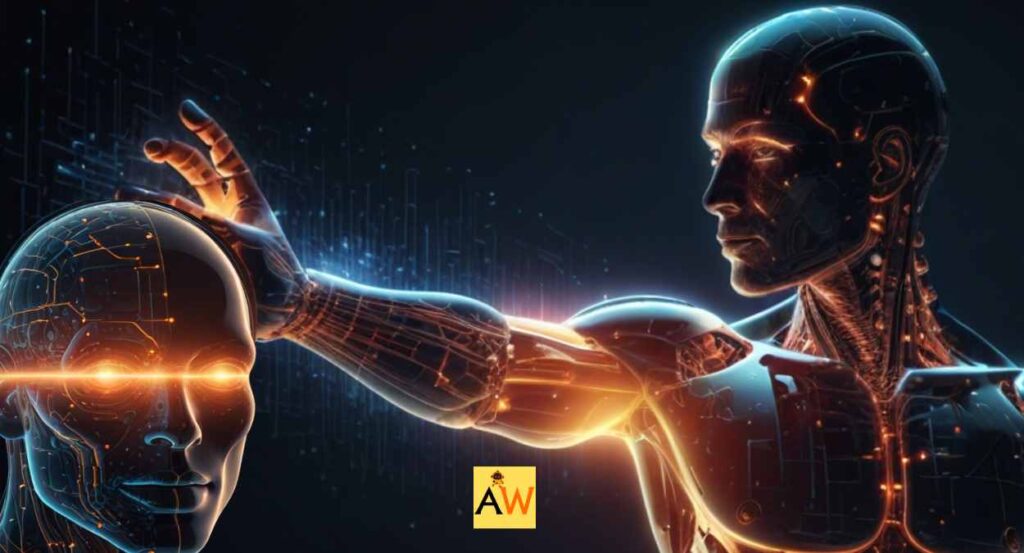
Demystifying AGI: What is Artificial General Intelligence?
At the heart of Sam Altman’s ambitious vision lies the concept of Artificial General Intelligence (AGI), a term that has captured the imagination of scientists, technologists, and futurists alike. But what exactly is AGI, and why is it considered such a game-changing frontier in the field of artificial intelligence?
In simple terms, AGI refers to the development of AI systems that possess the same general intelligence and reasoning capabilities as humans. Unlike current AI systems, which are designed to excel at specific tasks like language processing or image recognition, AGI aims to create machines that can think, learn, and adapt in the same flexible and versatile way that the human mind does.
Imagine an AI assistant that not only understands and responds to your queries but also possesses the ability to learn from experience, make connections between seemingly unrelated concepts, and generate novel ideas and solutions. This is the essence of AGI – an artificial intelligence that can reason, problem-solve, and acquire knowledge across a broad range of domains, just like a human.
The pursuit of AGI is often likened to the quest for creating an artificial human mind, capable of understanding the complexities of the world around us, grasping abstract concepts, and exhibiting traits such as creativity, emotional intelligence, and self-awareness.
While the path to achieving AGI is fraught with challenges and uncertainties, the potential implications of such a breakthrough are staggering. AGI could revolutionize fields ranging from healthcare and scientific research to education and economics, empowering humanity with an unprecedented level of cognitive augmentation and problem-solving capabilities.
As Altman and OpenAI continue to push the boundaries of AI development, their pursuit of AGI dominance represents a bold and ambitious vision, one that promises to reshape the very fabric of human knowledge and potential.

The Ethical Imperative of AGI Development
As the quest for AGI intensifies, it is imperative that the development of these advanced AI systems be guided by a robust ethical framework. The implications of creating artificial general intelligence are far-reaching, and the potential risks, if not addressed proactively, could be severe.
One of the key ethical considerations is ensuring that AGI systems are aligned with human values and priorities. As these systems become increasingly autonomous and capable of making complex decisions, it is crucial that they are imbued with a deep understanding of ethics, morality, and the principles that govern human society.
Another critical aspect is the responsible development and deployment of AGI technologies. Strict protocols and safeguards must be in place to prevent the misuse or malicious exploitation of these powerful AI systems, which could have catastrophic consequences if they fall into the wrong hands.
Transparency and explainability are also essential, as AGI systems must be designed in a way that allows for scrutiny and understanding of their decision-making processes. This will foster trust and accountability, ensuring that these advanced AI systems are operating in a manner that is fair, unbiased, and aligned with human interests.
Ultimately, the pursuit of AGI must be a collaborative endeavor, involving not only the technical experts and researchers but also philosophers, ethicists, policymakers, and the broader public. By fostering an inclusive dialogue and promoting a shared understanding of the implications and potential risks, we can ensure that the development of AGI is guided by a strong ethical foundation, mitigating potential dangers while maximizing the benefits for humanity.
As we navigate the uncharted waters of artificial general intelligence, the ethical considerations must remain at the forefront, shaping the direction and governance of this transformative technology to ensure that it serves the greater good of humanity and our collective future.

The Quest for Responsible AI: Principles and Governance
As the race toward AGI intensifies, the need for responsible AI development has become paramount. Organizations like OpenAI are actively working to establish principles and governance frameworks that prioritize transparency, accountability, and ethical considerations.
Some key principles guiding responsible AI development include:
- Alignment with Human Values: Ensuring that AI systems are designed to prioritize and align with human values, ethics, and well-being.
- Transparency and Explainability: Promoting transparency in AI decision-making processes and the ability to understand and explain AI outputs.
- Privacy and Security: Protecting individual privacy and safeguarding against potential misuse or malicious exploitation of AI systems.
- Fairness and Non-Discrimination: Mitigating biases and ensuring equitable treatment for all individuals, regardless of race, gender, or other protected characteristics.
- Human Control and Oversight: Maintaining human agency and control over AI systems, particularly in high-stakes decision-making scenarios.
By embracing these principles and fostering ongoing dialogue with stakeholders across diverse sectors, the AI community aims to navigate the complexities of AGI development responsibly and mitigate potential risks.

The AI Talent Race: Attracting and Nurturing Brilliant Minds
The pursuit of AGI dominance has sparked an intense global competition for top AI talent. As companies and nations recognize the strategic importance of this technology, they are actively investing in attracting and nurturing the brilliant minds that will shape the future of AI.
OpenAI itself has assembled an impressive roster of AI experts, including researchers, engineers, and thought leaders from prestigious institutions such as Stanford, MIT, and Berkeley. However, Altman acknowledges the need for a broader talent pipeline, emphasizing the importance of fostering AI education and providing opportunities for aspiring professionals to hone their skills.
“We need to be training way more people in this field,” Altman stated, underscoring the urgency of developing a robust AI workforce to fuel the continued advancement of the technology.
Initiatives such as partnerships with universities, specialized AI degree programs, and internship opportunities are crucial steps in nurturing the next generation of AI pioneers who will drive the evolution of AGI.
The Role of Interdisciplinary Collaboration
Achieving AGI will require more than just technical expertise in AI and computer science. It will necessitate a convergence of diverse disciplines, including neuroscience, psychology, philosophy, and ethics, among others.
By fostering interdisciplinary collaboration, researchers can gain insights into the complexities of human intelligence, cognition, and decision-making processes, informing the development of AGI systems that more closely mimic and potentially surpass human-level reasoning.
OpenAI’s partnerships with academic institutions and research centers across the globe aim to facilitate this cross-pollination of ideas and expertise, accelerating the path toward AGI while ensuring a holistic and responsible approach.
As the AI revolution continues to unfold, OpenAI’s ambitious pursuit of AGI dominance, driven by Sam Altman’s visionary leadership, promises to reshape the landscape of human knowledge and capabilities. While the path ahead is fraught with challenges and ethical considerations, the potential rewards of unlocking the full potential of artificial intelligence are too significant to ignore.
By embracing responsible development principles, fostering interdisciplinary collaboration, and nurturing a talented AI workforce, OpenAI and other pioneers in the field are paving the way for a future where the boundaries of human potential are redefined by the convergence of human ingenuity and artificial general intelligence.

The Convergence of AI and Human Intelligence
While the pursuit of AGI often invokes visions of machines surpassing human intelligence, Altman’s vision extends beyond this paradigm. Instead, he envisions a future where artificial and human intelligence converge, complementing and amplifying one another in unprecedented ways.
“It would know every email, every conversation I’ve ever had, but doesn’t feel like an extension,” Altman described his vision of a “super-competent” AI assistant.
This symbiotic relationship between humans and AGI systems could unleash a new era of collaboration, where the cognitive strengths of each are harnessed to tackle complex challenges and unlock new frontiers of knowledge and innovation.
Augmented Decision-Making and Problem-Solving
By leveraging the vast data processing and pattern recognition capabilities of AGI, humans could gain unprecedented insights and decision-making support. Complex problems that once seemed insurmountable could be broken down and analyzed from multiple angles, with AGI systems generating novel solutions and strategies.
This augmented problem-solving approach could revolutionize fields such as medicine, where AGI could analyze vast amounts of patient data, genomic information, and medical literature to recommend personalized treatment plans and identify potential breakthroughs.
Similarly, in scientific research, AGI could accelerate the discovery process by rapidly analyzing vast datasets, simulating complex systems, and identifying promising avenues for exploration.
The Societal Implications of AGI Adoption
As AGI systems become increasingly integrated into various aspects of society, their impact will extend far beyond the realms of technology and academia. Altman’s vision of a “super-competent” AI assistant raises profound questions about the societal implications of such intimate human-machine collaboration.
Privacy and Trust in the Age of AGI
With AGI systems potentially possessing intimate knowledge of our lives, from emails and conversations to personal preferences and habits, concerns surrounding privacy and data security will become paramount. Building trust in these systems will require robust governance frameworks, transparent data handling practices, and stringent safeguards against misuse or unauthorized access.
Organizations like OpenAI will need to work closely with policymakers, privacy advocates, and the general public to strike a delicate balance between harnessing the benefits of AGI while protecting individual privacy and autonomy.

The Future of Work and Economic Disruption
The advent of AGI is likely to disrupt traditional employment models and economic structures. As machines become capable of performing increasingly complex tasks, certain job roles and industries may face significant disruption or even obsolescence.
However, this technological shift could also create new opportunities and industries, as human ingenuity adapts to the changing landscape. Altman’s vision of humans and AGI systems working in tandem could pave the way for new forms of human-machine collaboration, where individuals leverage AGI capabilities to enhance their productivity and explore new avenues of creative expression and entrepreneurship.
Proactive measures, such as reskilling and educational initiatives, will be crucial in preparing the workforce for the AGI-driven future and mitigating potential economic disruptions.
As OpenAI’s pursuit of AGI dominance continues to gain momentum, the implications of their success will reverberate across all facets of society. While the path ahead is fraught with challenges and uncertainties, the potential rewards of unlocking the full potential of artificial intelligence are too significant to ignore.
By fostering responsible development practices, interdisciplinary collaboration, and a robust talent pipeline, OpenAI and other pioneers in the field are paving the way for a future where the convergence of human and artificial intelligence redefines the boundaries of what is possible, ushering in a new era of innovation, discovery, and human potential.

Frequently Asked Questions (FAQs)
Q. What is OpenAI’s ultimate goal, according to Sam Altman?
A. OpenAI’s ultimate goal, as stated by CEO Sam Altman, is to achieve Artificial General Intelligence (AGI) dominance, surpassing human-level reasoning with increasingly advanced AI models.
Q. How does Altman view ChatGPT in the context of OpenAI’s AI development?
A. Despite ChatGPT’s groundbreaking success, Altman has described it as “mildly embarrassing at best,” indicating that it is merely the beginning of OpenAI’s AI capabilities and that far more advanced models are on the horizon.
Q. What is Altman’s prediction for GPT-5 and GPT-6?
A. Altman has confidently stated that GPT-5 will be “a lot smarter than GPT-4,” and GPT-6 will similarly surpass GPT-5 in intelligence and capabilities, highlighting the rapid progress expected in OpenAI’s AI models.
Q. What is Altman’s vision for the ultimate AI assistant?
A. Altman envisions a “super-competent” AI assistant that goes beyond answering queries to actively assist in real-world tasks, possessing an intimate understanding of the user’s life and seamlessly integrating into their daily activities.
Q. How does Altman view the potential costs associated with developing AGI?
A. Altman has expressed a willingness to spend astronomical sums, up to “$50 billion a year,” if necessary, to stay on the trajectory of creating AGI, as he believes the eventual value created for society will far outweigh the costs.
Q. What is Altman’s perspective on the role of specialized hardware in AI development?
A. Altman believes that powerful AI applications, including the envisioned “super-competent” AI assistant, could potentially run in the cloud without the need for specialized hardware devices, although companies like Apple are exploring hardware solutions.
Q. How does Altman view the future of AGI development?
A. Altman predicts that multiple players will succeed in developing distinct versions of AGI, each with its own strengths and weaknesses, highlighting the diversity of approaches and solutions that may emerge in the pursuit of AGI.

Conclusion
As the AI revolution continues to gather momentum, Sam Altman’s revelations about ChatGPT being “mildly embarrassing” and his unwavering pursuit of Artificial General Intelligence (AGI) dominance have set the stage for a paradigm shift in the way we perceive and interact with intelligent machines.
With OpenAI’s relentless drive and willingness to invest astronomical sums, the tantalizing vision of a “super-competent” AI colleague that seamlessly integrates into our lives is no longer a distant dream but a tangible goal within reach. As GPT-5 and GPT-6 loom on the horizon, promising exponential leaps in intelligence and capabilities, the AI landscape is poised for a seismic transformation that will redefine the boundaries of what is possible. While the path ahead is shrouded in uncertainty, one thing is clear: OpenAI is determined to lead the
Also Read:
Get Ready to Switch: OpenAI ChatGPT Search Engine May Oust Google Soon
AI vs Human Intelligence: Exploring the Boundaries
AI Scamming: The Next Frontier of Fraud – Warren Buffett’s Ominous Warning
Microsoft Turbocharges Southeast Asia’s AI Journey with Massive Investments
How To Take Your Business To The Next Level With Your Secret Weapon- Generative AI
Revolutionizing Mobile AI: iPhone 16’s Game-Changing On-Device Generative AI
Uncovering the Truth: Deepfake Videos of Bollywood Stars Fuel Concerns in India’s Elections
Meta AI Chatbot Rolls Out on Instagram, WhatsApp & Messenger – The New Era Begins!
Google Drops Explosive AI Bombs at Cloud Next 24 – Prepare to Be Amazed
Emerging AI Investment: Fund Managers Bet Big on Untapped Potential
Will Google Start Charging For AI Powered Search Features In 2024?


